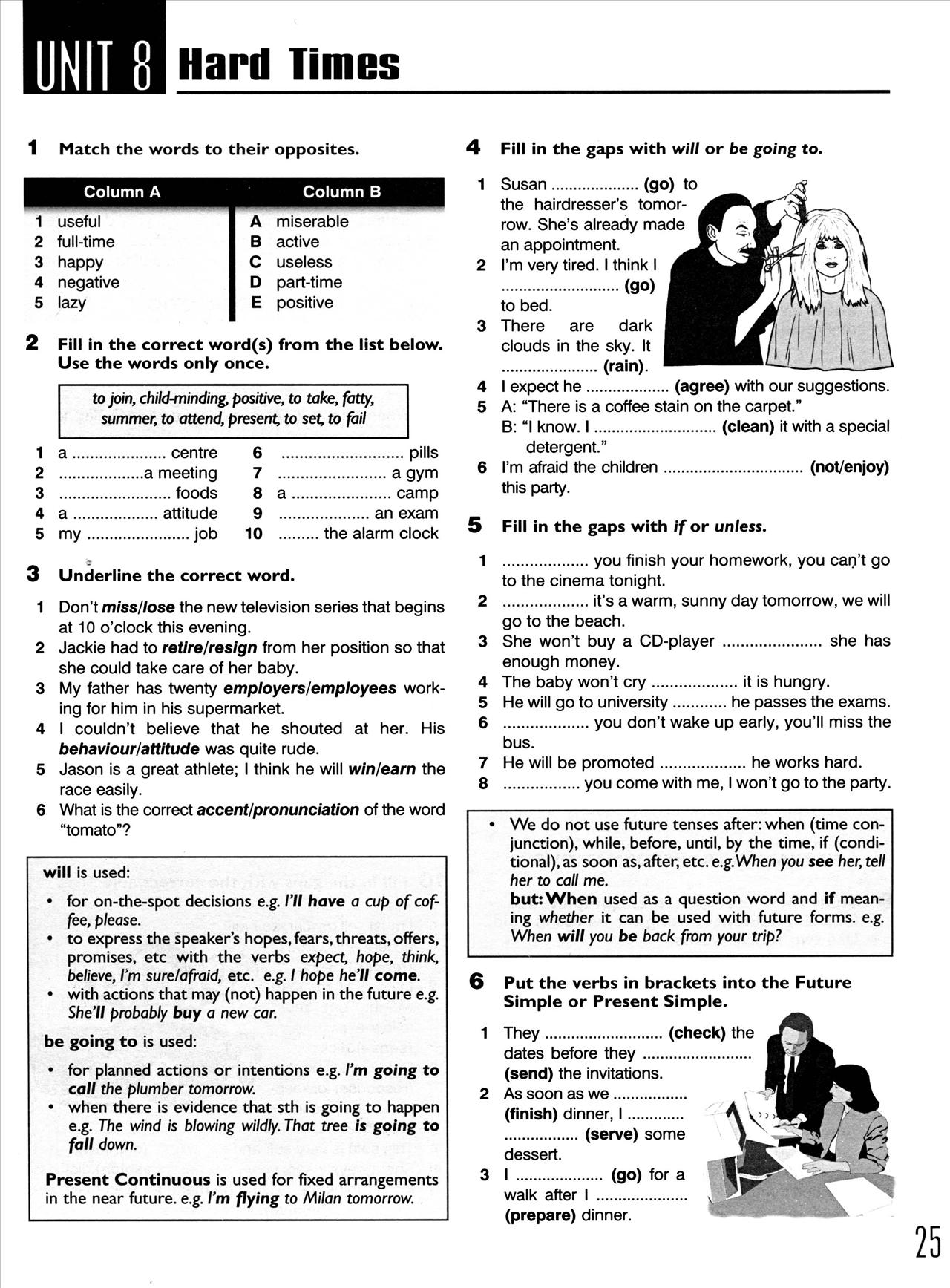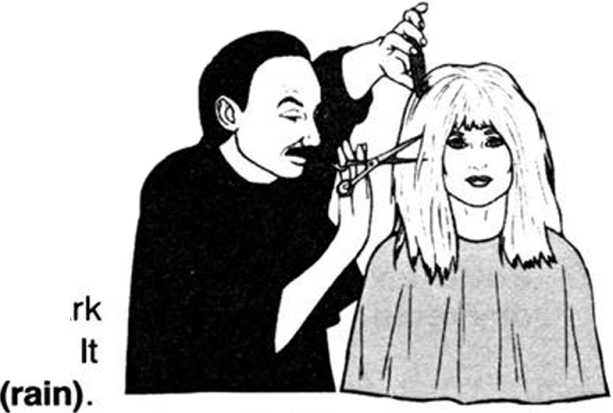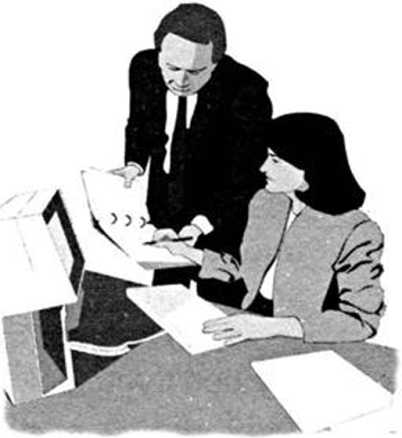worrkbook 3 page

1 Match the words to their opposites.
|
Column A |
Column B |
|
1 useful |
A miserable |
|
2 full-time |
B active |
|
3 happy |
C useless |
|
4 negative |
D part-time |
|
5 lazy |
E positive |
2 Fili in the correct word(s) from the list below. Use the words only once.
1 Susan....................(go) to
the hairdresser’s tomor-row. She’s already madę an appointment.
2 l’m very tired. I think I
...........................(go)
to bed.
3 There are da clouds in the sky.

4 Fili in the gaps with will or be going to.

to join, child-minding, positive, to take, fatty, summer, to attend, present, to set, to fail
|
1 |
a......... |
............centre |
6 ..... |
......................pills |
|
2 |
.......a meeting |
7 ...... |
..................a gym | |
|
3 |
.............foods |
8 a... |
...................camp | |
|
4 |
a......... |
..........attitude |
9 ...... |
..............an exam |
|
5 |
my...... |
.................job |
10 ...... |
... the alarm clock |
3 Underline the correct word.
4 I expect he...................(agree) with our suggestions.
5 A: “There is a coffee stain on the carpet.”
B: “I know. I............................(clean) it with a special
detergent.”
6 l’m afraid the children................................(not/enjoy)
this party.
5 Fili in the gaps with if or unless.
1 Don’t miss/lose the new television series that begins at 10 o’clock this evening.
2 Jackie had to retire/resign from her position so that she could take care of her baby.
3 My father has twenty employers/employees work-ing for him in his supermarket.
4 I couldn’t believe that he shouted at her. His behaviour/attitude was quite rude.
5 Jason is a great athlete; I think he will win/earn the race easily.
6 What is the correct accent/pronunciation of the word “tomato”?
1 ...................you finish your homework, you can’t go
to the cinema tonight.
2 ...................it’s a warm, sunny day tomorrow, we will
go to the beach.
3 She won’t buy a CD-player ...................... she has
enough money.
4 The baby won’t ery...................it is hungry.
5 He will go to university............he passes the exams.
6 ...................you don’t wake up early, you’ll miss the
bus.
7 He will be promoted...................he works hard.
8 .................you come with me, I won't go to the party.
will is used:
• for on-the-spot decisions e.g. Tli have a cup of coffee, please.
• to express the speaker’s hopes, fears, threats, offers, promises, etc with the verbs expect, hope, think, believe, Tm sure/afraid, etc. e.g. I hope he’ll come.
• with actions that may (not) happen in the futurę e.g. She’ll probably buy a new car.
be going to is used:
• for planned actions or intentions e.g. I’m going to cali the plumber tomorrow.
• when there is evidence that sth is going to happen e.g. The wind is blowing wildly. That tree is going to fali down.
Present Continuous is used for fixed arrangements
in the near futurę, e.g. Tm flying to Milan tomorrow.
• We do not use futurę tenses after: when (time con-junction), while, before, until, by the time, if (condi-tional), as soon as, after, etc. e.g.When you see her, tell her to cali me.
but: When used as a question word and if mean-ing whether it can be used with futurę forms. e.g. When will you be back from your trip?
6
1
2
3
Put the verbs in brackets into the Futurę Simple or Present Simple.
They...........................(check) the
dates before they..........
(send) the invitations.
As soon as we.................
(finish) dinner, I.............
.................(serve) some
dessert.
I .................... (go) for a
walk after I .....................
(prepare) dinner.

Wyszukiwarka
Podobne podstrony:
My name: Class:Test 1BLessons 1-5Vocabulary 1 Match the words to make phrases. There Is one extra
36410 stronaq (3) Grammar I Past Simple: irregutar verbs 7 Look at the Active grammar box. Match the
K6?ademic Glossary 1 Marks: 1 Match the words and definitions. for a particular reason. purpose. etc
Academic Vocabulary K6 1 Marks: 1 Match the words and the definitions. in a way that is easy to unde
Fod vocab FoodVOCABULARY BANK a Match the words and
cw0035 UNIT 8Humań resources Q
My name: Class:Lessons 6-10 Vocabulary 1 Match the words and płctures. There Is one extra word. fold
Lessons 6-10Vocabulary 1 Match the words and plctures. Therc ls one extra word. Complete the words u
CCI20080430�002 ‘•a-*--•• v**w:. a. i d Reorder the words to make sentences. 1 see
54907 strona (14) Lead-in 1 a Match the photos to verbs and verb phrases in the box. cook dance go
56418 stronaY (3) 6 a Complete the questions from the interview with did or a question word. Th
domy dla zwierząt7 Match the antnuN to thotr homdVAihfrout.com
match the words o ■o ic-specific vocabularyLearning languages Completc the tentencei with a word or
polacz w pary Match the aninuK to thctr homo.Kidsfront.com
więcej podobnych podstron